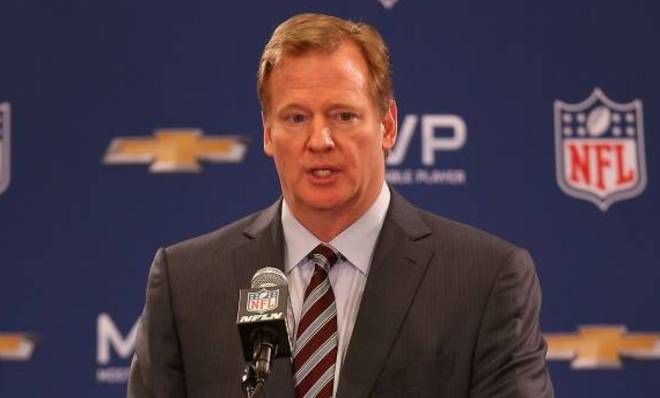Frontline: How the NFL covered it up its devastating head-injury problem
An unflinching documentary explores the league's refusal to come clean on football's health risks


The National Football League has for two decades systematically denied any link between football and brain trauma — dismissing the issue as "pack journalism" — despite a growing body of scientific evidence. The league has even gone so far as to discredit researchers in an attempt to insulate itself from a potential fallout.
That's the case put forth in a new Frontline documentary, League of Denial, which premieres Tuesday, October 8, on PBS. The documentary, based on reporting by brothers Mark Fainaru-Wada and Steve Fainaru, who have published a book of the same name, presents an exhaustive account of how the league for years dismissed an issue critics have assailed as an epidemic.
"The way the NFL s--t on all this research, and tried to peddle their own to their players and the public for years and years, to me is really irresponsible, unhelpful," Fainaru told The Week in a recent interview.
Subscribe to The Week
Escape your echo chamber. Get the facts behind the news, plus analysis from multiple perspectives.

Sign up for The Week's Free Newsletters
From our morning news briefing to a weekly Good News Newsletter, get the best of The Week delivered directly to your inbox.
From our morning news briefing to a weekly Good News Newsletter, get the best of The Week delivered directly to your inbox.
The documentary's opening segment focuses on Mike Webster, a former Pittsburgh Steelers center who played with the team's "Steel Curtain" squads in the 1970s. After he retired, Webster's health rapidly declined to the point where, his children say, he would sometimes forget that he could put on a coat when it got cold. He sought disability payments from the NFL, and the league's retirement board, in agreeing to make those payments in 2000, gave a shocking, though little-noticed pronouncement: Football had caused his mental problems.
Webster died two years later. A subsequent examination of his brain, conducted by a then-unknown doctor named Bennet Omalu, revealed Webster suffered from chronic traumatic encephalopathy (CTE), a degenerative neurological disorder. It was the first time anyone had found CTE in a football player, and the discovery threatened to shake the league.
"If Webster's brain had not been examined," Fainaru says in the film, "I honestly don't think that we'd be where we're at now."
Yet rather than embrace the finding, the league launched a campaign to obliterate Omalu's credibility, calling him a "doctor of voodoo medicine" and even, in an extraordinary move, demanding he retract his findings.
Sign up for Today's Best Articles in your inbox
A free daily email with the biggest news stories of the day – and the best features from TheWeek.com
That was hardly the NFL's first assault on the issue. Back in the 1990s, when reporters began to raise questions following a spate of concussions, then-Commissioner Paul Tagliabue derisively called it "pack journalism." Nevertheless, he assembled a committee — the Mild Brain Traumatic Injury (MBTI) committee — to probe the link between football and head injuries.
The results, perhaps unsurprisingly, were favorable to the game. A series of 16 reports, written by handpicked doctors and team physicians, claimed there was no "chronic cumulative" effect from mild brain trauma.
"There's this very weird disconnect where you had the disability committee, which is overseen by the commissioner, that's doling out money for brain damage related to football," Fainaru told The Week, "while at the same time, the committee that was assembled by the commissioner to study the issue of football and brain damage, is denying unequivocally that that's even possible."
Over the years, researchers like Dr. Ann McKee again and again found the same signs of CTE while studying the brains of deceased players. Of the 46 brains McKee studied, she diagnosed CTE in 45 of them.
"I'm really wondering if every single football player doesn’t have this," McKee says in the film.
The denials have continued under current Commissioner Roger Goodell. Though Goodell overhauled the league's investigative committee and donated millions to independent researchers, Fainaru questioned whether he was really taking the issue to heart, or merely papering over it with a calculated PR campaign.
"The question is, 'How seriously can you take them?' When they've, for so long, denied that this was even a problem," he said.
In late August, with the football season about to get underway, the NFL settled a $765 million lawsuit with the 4,500 players who alleged the game irreparably damaged their brains. However, the settlement contained no admission of wrongdoing — and again refuted the notion that football caused brain damage.
Weeks later, a New York Times report claimed the league had pressured ESPN — which initially participated in Frontline's investigation — to back out of the final product. Given the NFL's heavy-handed methods for dealing with critics in the past, many saw that as a sign the league was, yet again, trying to squelch dissent.
Fainaru said that while it would be "disappointing" if that claim were true, ESPN had nonetheless played an integral role in helping his team conduct their research.
"The journalism hasn't changed at all," he said. "The book is exactly the same as it was, the film is exactly the same as it was. The reality is both of these projects are creatures of ESPN. They never would've happened without the full resources and support of ESPN."
Both reporters said they were big football fans and did not think the game itself should be spurned. But knowing what they do now about brain trauma and football, neither could conclusively say whether they would want their kids to play the sport.
"I don't know," Fainaru told The Week, noting that research was still coming along and the debate about whether football was safe would not be settled for a long time. Still, he added, "I think it would be hard to justify letting [my son] do that."
Jon Terbush is an associate editor at TheWeek.com covering politics, sports, and other things he finds interesting. He has previously written for Talking Points Memo, Raw Story, and Business Insider.
-
 Is this the end of cigarettes?
Is this the end of cigarettes?Today's Big Question An FDA rule targets nicotine addiction
By Joel Mathis, The Week US Published
-
 A beginner's guide to exploring the Amazon
A beginner's guide to exploring the AmazonThe Week Recommends Trek carefully — and respectfully — in the world's largest rainforest
By Catherine Garcia, The Week US Published
-
 What is the future of the International Space Station?
What is the future of the International Space Station?In the Spotlight A fiery retirement, launching the era of private space stations
By Joel Mathis, The Week US Published